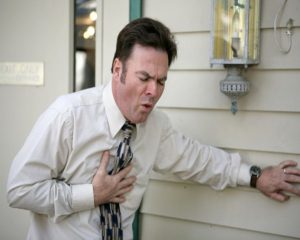
This type of pain is often described as being sharp in nature, with intensity varying from dull to severe. Stabbing pains in the chest may present as a constant ache or come and go intermittently. This is the common presentation for most types of stabbing pains in chest, but knowing which additional signs to look for will help you better make the decision to seek emergency help or not.
Causes of stabbing pain in chest
There exist a multitude of reasons why someone may experience a sharp stabbing pain in the chest. However, not all cases are serious enough to warrant immediate medical attention. The following are some possible causes for stabbing chest pain.
Gastrointestinal problems: Perhaps the most common cause of stabbing chest pain, as the esophagus lies behind the sternum. Conditions such as acid reflux, esophageal ulcer, and gastro-esophageal reflux disease can all lead to pain and are often confused with heart problems. A common sign that acid reflux is the addition of an unpleasant metallic taste in the mouth accompanying chest pain that may burn.
Respiratory problems: Disorders of the respiratory tract cause stabbing chest pain and can be quite severe. Conditions such as hemothorax, blood between the chest wall and the lung; pneumothorax, air between the chest wall and lung; pneumonia; and pleuritis are all possible causes of chest pain. Cancer in the mediastinum tissue or bronchus can also be appreciated as chest pain. Respiratory conditions causing stabbing chest pain are often worsened upon deep breathing, movement, or coughing.
Musculoskeletal injury: Strained chest muscles can lead to a sharp stabbing-like pain and can be a result of strenuous exercise or injury to the chest muscles caused by unusual movements. Pain can often be reproduced with chest wall movement and by palpation. Rest will ease the pain and promote healing.
Fractured bone: Your chest wall is lined by many ribs, that if broken, can lead to the development of stabbing chest pain. Fractured ribs can poke into regions of the diaphragm, causing additional symptoms as well as becoming problematic by further piercing the lungs after the initial fracturing incidence.
Cardiac problems: By far the most worrisome complication that medical professionals want to rule out first when presented with a case stabbing chest pain. Heart attacks, heart fibrillation, pericarditis, angina, and mitral valve prolapse are all problems that can mimic more benign causes of chest pain. Having chest pain stemming from cardiac origins will often present with additional symptoms such as severe pain that radiates to the left arm, back, or jaw.
Tumors: Tumors found near the sternum, whether benign or malignant, can be a major cause of stabbing chest pain. They will need imaging studies such as an MRI or CT scan to confirm and begin treatment.
Anxiety and panic attacks: In addition to sharp chest pain, suffering from a panic attack or anxiety can also present with a racing heartbeat, sweating, breathlessness, and dizziness. Most attacks last for five to 20 minutes, with psychotherapy and medication helping sufferers cope.
Other causes of sharp chest pain:
Pulmonary embolism: Caused by a traveling blood clot from the lower extremities that become lodged in the lung parenchyma. This is a medical emergency that requires immediate attention.
Precordial catch syndrome (PCS): Pain is often felt below the left nipple, making sufferers fear the worst as the heart is located here. However, unlike cardiovascular cases of chest pain, PCS chest pain does not radiate to other parts of the body.
Costochondritis: A medical condition commonly caused by the inflammation of costal cartilages which join the ribs and the sternum (breastbone). Inflammation may be a result of respiratory infections, repetitive strain, or direct injury to the chest. Injury to these bones or ones like them is frequently seen in athletes who play tennis, squash, and golf.
Shingles: Caused by the same virus that leads to the development of chicken pox, shingles can present later in life, presenting as a rash on the chest or torso that is very painful
Pericarditis: Inflammation of the sac covering the heart, which can lead to the development of sharp stabbing chest pain.
How to investigate stabbing pain in chest
There are many different causes of chest pain, some of which may require alternative methods of investigation. However, one of the most integral parts is the initial physical examination by a doctor, as they can use their best judgment as to whether a person is suffering from a heart attack or is simply having acid reflux. If further investigation is required, the following tests may be utilized:
- Blood tests
- Chest x-ray
- Electrocardiogram (ECG)
- Computed tomography (CT) scan
- Echocardiogram
- Cardiac stress test
- Endoscopy
- Myocardial perfusion scintigraphy
- Angiogram
How to treat stabbing pain in the chest
Depending on the underlying cause, treatment for your specific cause of stabbing chest pain will differ. Some conditions may only require lifestyle changes and diet modifications while others require lifelong use of medications or even surgery. It is important to work closely with your doctor to find out all the things you can do on your own to reduce your risk of serious complications and to get the best treatment that is right for you.